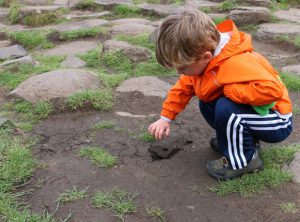17a Introduction to Human Relationships with Earth Processes
Learning Objectives
- Understand your impact on Earth
- Describe how Earth Science relates to your life
Earth’s story is your story
Why should you care about any of this?
You are an Earthling. You are were born on this planet, and you will live out your entire life on its surface. The atoms from which your body is constructed are atoms that have been on this planet for more than four billion years, repurposed endlessly before becoming part of you, and destined for continued eternal recycling after you die. The carbon that makes up your eyeballs, your neurons, and your fingertips was derived from food you ate, and the plants who captured that carbon pulled it from the atmosphere, and it got there perhaps from volcanic emissions, or exsolution from the ocean, the rotting of a dinosaur, or the combustion of ancient coal. You are literally made of Earth bits. When you eat or breathe or pee, you are connecting with the Earth, as surely as a child poking around in the soil.

You and I are fortunate to live on a very interesting planet. Earth is big enough to have differentiated. This allowed the development of a metallic core, whose circulation powers a magnetic field that protects our atmosphere from erosion by the solar wind. Differentiation also provides for mantle convection, the power source driving plate tectonics. The eruption of volcanoes and gravitational acquisition of comets both yield water, and this water is critical for life. Every critter and microbe needs liquid water, and for 4.5 billion years, our planet’s surface has had the right blend of solar heating and greenhouse gas insulation to keep the water flowing. What fortune! Every move we make, every breathe we take, we rely on geology.
How has this charmed situation come to pass? If you speak Rock, you can learn some of the backstory. If you speak Rock, a drive through the mountains or the patterns in a fancy countertop become interesting tales, potentially shocking revelations. If you speak Rock, you can answer questions about the circumstances that led to your very existence.
Understanding Historical Geology is essential work for the sake of our species’ future, and —more personally — for the sake of feeling at home here on the most fascinating planet in the neighborhood.
Licenses and Attributions
Historical Geology by Open Geology, Callan Bentley, Karen Layou, Russ Kohrs, Shelley Jaye, Matt Affolter, and Brian Ricketts (in progress). License: CC-BY-NC
Adaptation: Renumbering, Remixing

